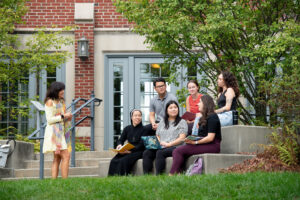Teacher Certification and M.Ed. in Urban Teaching
Shape the potential of middle and high school students (grades 7-12) with the greatest need
Providence College’s Teacher Certification Program (TCP) and Master of Education in Urban Teaching offer a unique pathway to teach biology, chemistry, English, mathematics, physics, and social studies within diverse, urban settings. Approved by the Rhode Island Department of Education, your certification can also be used (through reciprocity) to achieve certification/licensure in at least 45 other U.S. States.

This TCP/M.Ed. combination is designed for working adults. Its eleven courses may be fulfilled on a part-time basis. All students must complete a full-time, 12-week classroom experience as the final requirement. Students must have completed a bachelor’s degree or the equivalent (30+ credits) in their intended teaching subject.
Other highlights of the TCP/M.Ed. in Urban Teaching include:
- Curriculum that addresses the biggest challenges in today’s urban classroom
- Instruction provided by current and former teachers, principals and superintendents
- Coursework offered year-round in the evenings (online and on campus)
- 60 hours of field experience gained during the pursuit of regular coursework
- Small classes with other motivated adult learners
- Surprisingly affordable tuition that’s comparable to state schools
Upon completion, students will be competent in integrating Rhode Island Professional Teaching Standards within their teaching practice. They’ll also be eligible for certification upon successful completion of student teaching and the Principles of Learning and Teaching Praxis test for grades 7-12 (including a passing score on the appropriate Praxis content area test).
By the Numbers
45
states in which this credential may be used to achieve certification/licensure
27
credits focused on teaching standards and field experience
15
graduate credits focused on culturally competent teaching practices
Major Coursework
Our curriculum addresses the biggest challenges in today’s urban middle and high school classroom. You’ll learn about classroom management, cultural competency, project-based learning, and strategies to work with students who are English learners among other best practices. We prepare teachers to engage students and help them set and achieve their academic goals.
Note: This program requires 60 hours of field experience in school settings prior to the culmination of a student teaching experience. Students will work with our Placement Director to arrange these clinical experiences around their work schedules.
EDU 791: Educational Psychology (3 credits)
Study of those facts and principles of psychology that will assist the students in formulating and clarifying objectives as classroom teachers. Deals with such matters as cognitive development, motivation, retention, problem solving, and the social and emotional problems involved in personality integration.
EDU 792: Principles of Secondary Education (3 credits)
This initial secondary education course introduces the concepts and practices of teaching. Students will learn to develop lesson and unit plans, practice teaching techniques and explore the roles of classroom management.
EDU 786: The Exceptional Child in the Regular Classroom (3 credits)
Designed to provide prospective teachers with the skills, knowledge, and attitudes required to identify students with special needs and to work with support staff in meeting the students’ needs within the general curriculum. Focuses on understanding the characteristics of these students and on developing sensitivity to their needs within a least restrictive environment.
EDU 785: Educational Measurement (3 credits)
Designed to introduce students to the theory and practice of measurement including the construction, application, and interpretation of standardized and teacher-made tests used to inform teaching and curriculum decision making. Students will also examine alternative assessments including authentic and portfolio assessments.
EDU 622: Reading in the Content Area (3 credits)
Course investigates the use of specific strategies to incorporate into the teaching of content subjects. Research relating to reading skills taught in content areas is reviewed. Texts and research material address content in grades 5 through 12. Cooperative learning model is utilized in course. Model and exemplary programs in use in local school districts are examined.
EDU 787: Methods in Secondary Education (3 credits)
Course provides the student with the opportunity to develop skills in the teaching process. Emphasis is on the practical aspects of the teaching methodology. Attention is given to individual needs in the content area. Students will register for the English/Social Studies or Math/Science section.
EDU 661: Culturally Competent Teaching (3 credits)
To level the playing fields for our students, our classrooms must be built upon a culture of achievement – where students are inspired to exceed expectations and are committed to changing the trajectory of their lives. This course addresses these goals by fostering a deeper understanding of the sociocultural contexts of students and developing appropriate strategies for motivating them toward high achievement.
EDU 662: Differentiating Instruction for Diverse Urban Learners (3 credits)
The task of differentiating instruction is challenging but essential in accelerating learning for all students. Despite the varying levels of our students, educators have the responsibility to not only reach all students, but uphold the highest expectations for learning. This course explores key questions related to teaching all students well and focusing on high achievement for all.
EDU 663: Diversity Seminar (3 credits)
Research on urban teaching has identified traits of effective urban teachers as well as approaches to teaching that are linked to increases in urban student success, both academically and socially. This course focuses in detail on these traits and teaching methods and how they can best be implemented in the participants’ own classrooms.
EDU 664: Capstone: Successful Urban Teaching (3 credits)
Students will synthesize their prior coursework in the program with their work in urban school settings. This assists them in their further professional development as problem identifiers and problem solvers- teacher leaders as well as teacher researchers. Each student completes an action research project and presents his or her work in the Capstone Colloquium.
EDU 665: English Applied Linguistics (3 credits)
Exposes students to various components of English for the purposes of developing greater comprehension of how languages work and for developing skills of linguistic analysis to support the development of English Language Learners (ELLs). Holistically examines the process of language learning, exploring the contrastive Analysis and Error Analysis methodologies.
EDU 455: Student Teaching (9 credits)
Student teaching is a full-time, 12-week experience in classroom in grades 7-12, which is often completed in one of our partner schools. It is the final requirement in the Teacher Certification Program. The Clinical Educator (host teacher) and a Providence College faculty member provide supervision and feedback throughout the experience. Weekly seminars are conducted by the faculty member, as well.






